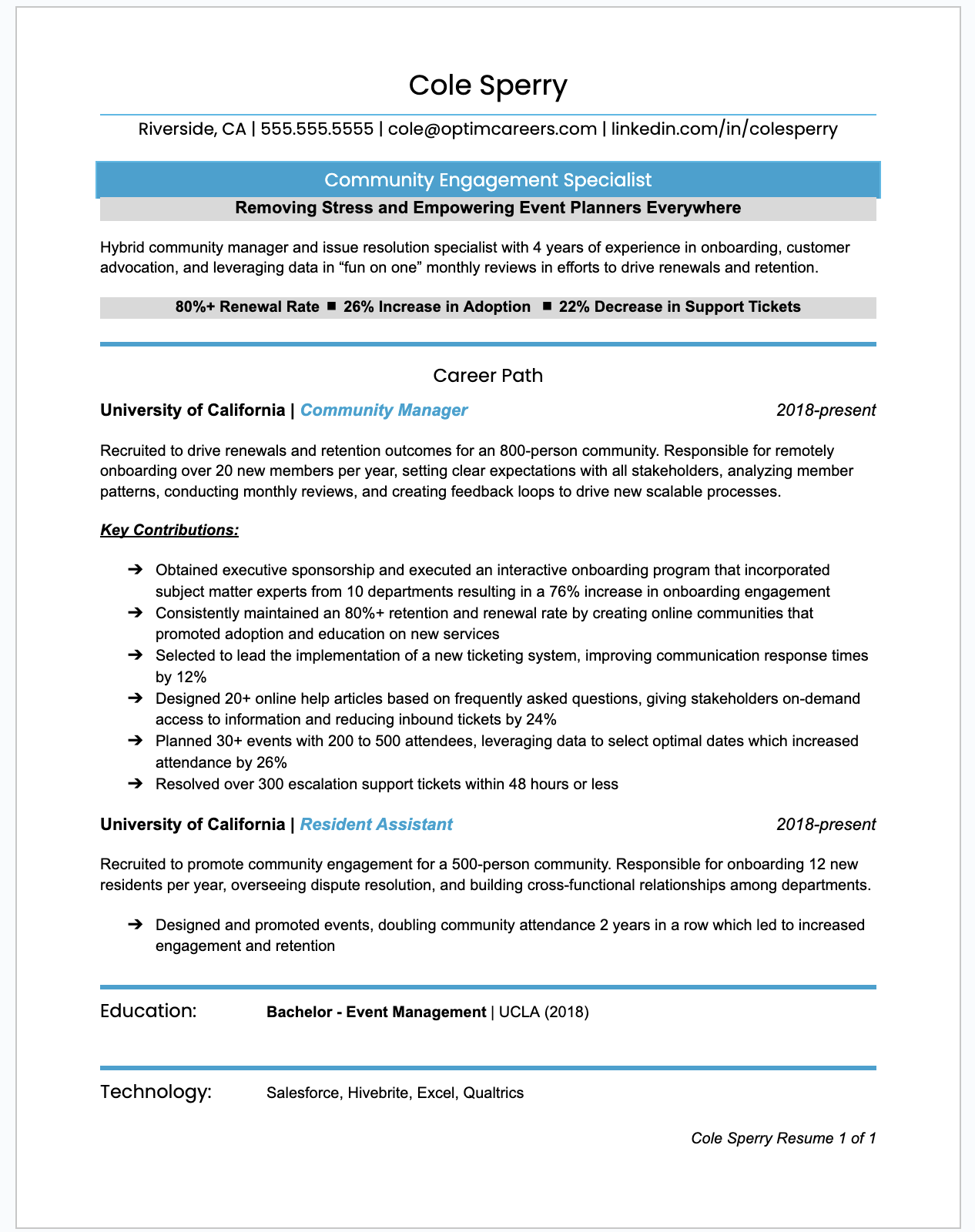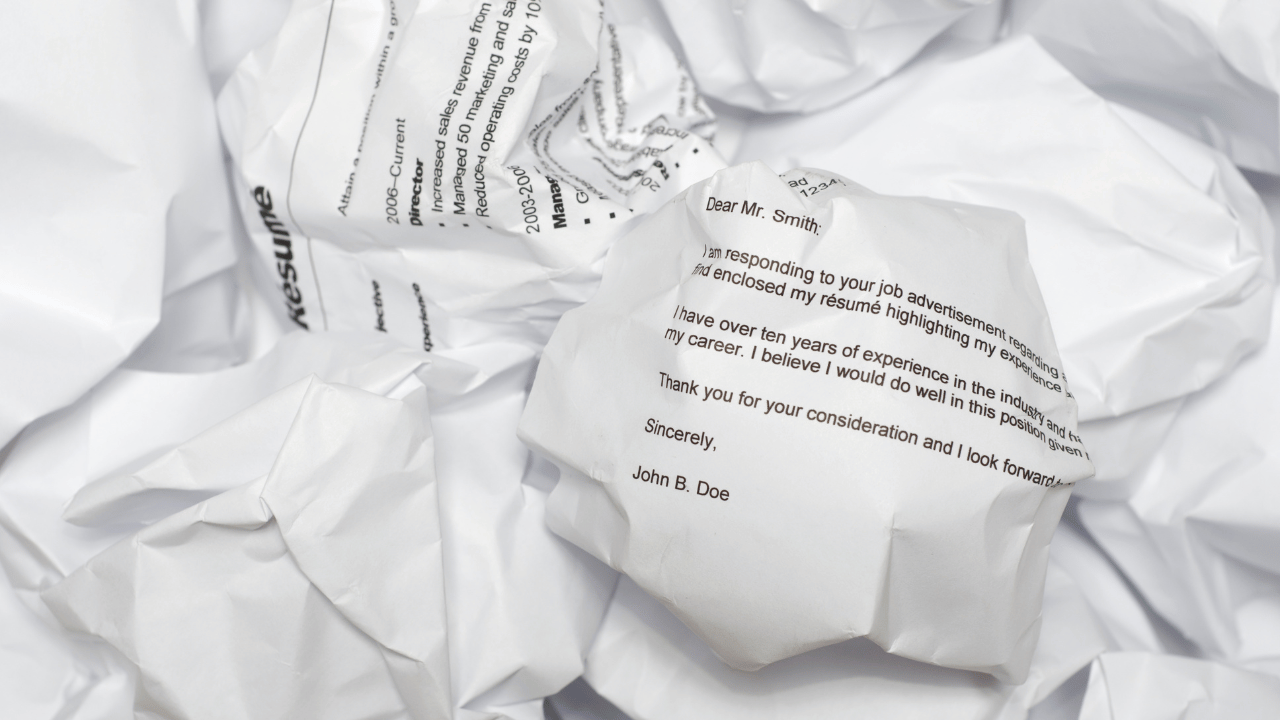Targeted Resume: The Definitive Guide [With Examples]
Resume writers swear by the targeted resume. Ask any one and they’ll tell you that targeting a resume is a surefire way to obtain the interview for the job you want.
There are surely advantages to creating a targeted resume, but I don’t believe you need one for every job you apply for. That being said, you may wish to write a targeted resume for certain situations and it is definitely a valuable tool.
In this article, I’ll outline the following:
What is a targeted resume?
The pros can cons of a targeted resume.
Who can benefit from a targeted resume.
When you should use a targeted resume.
How to write a targeted resume.
Targeted resume examples so you can see it all in action step-by-step.
Targeted resume templates.
Whether you have to start from scratch each time you write a targeted resume.
And other target resume questions I’ve received over the years.
What Is A Targeted Resume
A targeted resume is a document designed to showcase your unique qualifications for one specific job. It focuses on the skills and experiences required to do a specific job at a specific company. And oftentimes, it omits skills and experiences that aren’t asked for by a specific employer.
Targeted resumes are written to speak to one hiring team at one company, hiring for one particular type of role. The idea is that by targeting the resume, you make it easier for the recruiting team to understand that you possess the particular skills and experiences they are looking for. In addition, you don’t distract recruiters and hiring managers with information they don’t need.
Think of the last time you bought something. I bought a refrigerator a few years ago. One salesperson told me about everything their refrigerator could do. It was a laundry list of specs and features that I didn’t fully understand or need. Another one told me that their refrigerator would keep my vegetables fresh for four weeks longer than the others and only told me about the features I needed for the problem I had. That’s what a targeted resume does.
A targeted resume will make use of industry-specific language. It will discuss your job experiences as it relates to the job you are applying for and not based on everything you did at your last job. And it will highlight transferable skills and similarities between your background and the company you are applying to.
Pros and Cons of Targeted Resumes
Before we discuss whether or not you should write a targeted resume, let’s cover some pros and cons that will help you make the decision for yourself.
Advantages of Targeted Resumes
Targeted resumes provide some great benefits to those who decide to write and use them. The advantages of a targeted resume are:
They are brief and easy for recruiters to read. You are in a race to communicate clearly and a targeted resume is the quickest way to do so.
They are direct and relevant. If you confuse, you lose. Anyone reading a targeted resume will quickly understand what you can do for them.
They can brand you as a specialist for a particular job. Most employers are looking for someone to help them solve a narrow set of problems.
Disadvantages of Targeted Resumes
Targeted resumes also have some drawbacks to them. You should consider these when deciding whether or not to write one. The disadvantages of a targeted resume are:
They take a lot of time and their use is limited. Spending an hour writing a targeted resume for one job is a big bet sometimes, especially when it doesn’t pay off.
They take more time and effort to write. It’s not easy to pull off an effective targeted resume.
They can lead to quick rejection emails if you target incorrectly. By excluding things outside of the job description, you could miscalculate your targeting and not communicate skills and experiences that the hiring manager may find valuable.
Overcustomization can make your resume unbelievable. No one wants to see their exact words from a job description copied and pasted into a resume.
They can be too light on experience. If you lack certain experiences, your targeted resume could be too light.
Writing too many targeted resumes can severely diminish your return on investment. There’s an opportunity cost to everything.
Now you may be thinking because I wrote twice the number of disadvantages, that writing a targeted resume doesn’t make sense. That’s not the case. There are instances when writing a targeted resume makes great sense. You just have to be smart about the decision.
Who Should Use a Targeted Resume
Targeted resumes can work for anyone regardless of position, title, or industry. I’ve seen recent graduates, mid-career professionals, career changers, and senior executives use them to their advantage. After recruiting and writing resumes for nearly a decade, I’ve found that targeted resumes work best for the following categories of people.
Career Changers
If your experiences are unconventional or don’t match the job description perfectly, a targeted resume can help you translate your career in a relevant way for recruiters and hiring managers to understand your value. Rather than write about what you’ve done in the past through your previous job’s lens, a targeted resume can help you write about it relevant to your next job’s lens.
A targeted resume can also help you demonstrate transferable skills.
Tenured Professionals
At a certain point in our professional lives, we end up acquiring a diverse set of experiences that could lead us to be great at many different roles. We’ve taken on additional responsibilities and had promotions. A targeted resume can help mid-career and senior career professionals highlight relevant experiences that make our case for being well suited for a particular job.
When Should You Use a Targeted Resume
The conventional wisdom on the internet tells you to use a targeted resume whenever responding to a job posting because it improves your odds of getting an interview. The problem with that advice is it doesn’t account for, what I call, the point of diminishing returns. There is a point where writing a targeted resume for every job becomes unproductive.
Let’s say you spend six hours applying for jobs each day. That’s a lot of time by the way. And let’s also estimate that it takes about an hour to write a targeted resume. You can only apply for six jobs each day. Whereas someone using my segmented master resume strategy could apply for twenty-five jobs each day with the same amount of time.
So it doesn’t always make sense to write a targeted resume for every job. Especially when you can write a segmented master resume that covers an entire job category.
Here are the two times when I would write a Targeted Resume instead of a Segmented Master Resume:
If I’m writing for a unique job that requires a unique resume. It’s a one-of-a-kind job that fits my background.
If I’m writing for a job that I’m exceptionally qualified for and excited about. It’s a job worth putting in extra effort to get noticed.
Keep in mind that if you aren’t willing to put in the effort to write an exceptional resume, don’t bother creating a targeted resume. You can’t cut corners here.
How to Write a Targeted Resume
Now that we know what a targeted resume is and whether we should use one, let’s cover how to create a targeted resume.
Identify a Specific Job You Want to Apply For
The first step to writing a targeted resume is to know who you are writing it for. You’ll want to find a specific job that interests you and is worth the time and effort of a targeted resume. Save the job listing so you can review it carefully.
Study the Job Description
This part is the most challenging for many. If you find it stressful trying to figure out what is important and what isn’t, don’t worry, it’s not you. I’ve worked with hundreds of employers and hiring managers over the years and I can tell you without hesitation that they have just as much challenge writing a job description as you do a resume.
I’ve read many job descriptions myself, as a trained, experienced recruiter, and walked away confused and frustrated. So give yourself some grace.
Here’s how to study a job description in order to come up with resume content:
Start by making a list of problems this job solves for the company. Write down everything that comes to mind when reading the job description. You may have to read in between the lines. If you need help with this, I highly recommend this How to Read a Job Description guide.
Sample a few other similar job descriptions at similar companies for the same job. One of the disadvantages of a targeted resume is that you can copy too much from the job posting and become too niche. To avoid this, review other job descriptions for similarities. What you are looking for are common requests that may be absent in the specific job writing for, but may be in most other job listings. Add those to your list of problems.
Decide on a Resume Narrative
Now that you’ve added all these job duties and problems to that list, you need to come up with a concise narrative. The human brain can only remember three to four things at once (National Center for Biotechnology Information). In fact, it’s really hard for us to memorize new information. Just think about how long it took you to memorize the address when you moved last.
To help recruiters and hiring managers remember the information we are communicating in our resume, we want to come up with one core narrative and three to four resume themes. Let’s dive into how to do this.
Start by categorizing everything on your list into themes. For example, if you were targeting a customer success job, you may have things like improving the adoption of technology and increasing the utilization rate. Both of these could be categorized under one theme of increasing retention. They are all mechanisms to increase retention. Retention is the “big-picture” problem you are solving and could become a resume theme.
Keep condensing your list down until you have three to four themes. By putting your ideas into a limited set of themes, you’ll ensure the hiring team processes your information and remembers you.
Once your list is categorized into themes, you can come up with one central, controlling message that encompasses all of them and shows your unique value as a candidate.
Write a Tailored Resume Summary
Your resume summary will set the tone and the narrative for everything you write next. It gives the reader a quick overview of what to expect if they continue reading your resume. Based on your resume narrative and the specific job you’ve identified, you’ll want to write about:
the central problem you solve,
who you solve that problem for,
how you solve that problem, and
what results the reader could expect if they hired you.
For a resume summary formula and more information about what to put in your targeted resume, check out Chapters Four and Five of the Definitive Guide to Resume Writing.
Write Targeted Resume Work Experience
Writing about your work experiences can be a bit tricky for a targeted resume, but you got this. The key is to view your experiences through the lens of the person reading your resume. In this case, the recruiting and hiring teams. What would they find most relevant about your experiences? How can you write about your job experiences so they will understand how they are relevant to their opening?
With a targeted resume, you may have to translate your experience for the hiring manager. Remember, they don’t have the same background as you do. We often assume that hiring teams know more than they do. You want to make it incredibly easy for them to understand what you’ve done and how it is relevant to them.
For example, if you were a career changer headed into the technology space, you may use terms such as SDR (sales development representative) instead of sales representative. Also, avoid any industry-specific language that the reader won’t understand.
Remember that words have meaning. If you were in student services and pivoting out into private industry, you may choose not to use words such as students and faculty too often. That doesn’t paint the right narrative. Instead, you may use words like stakeholders, staff, team members, and the like. Words have meaning. Choose your words wisely.
You can find a complete guide on writing work experience in Chapter Five of my resume guide.
Other Resume Sections for a Targeted Resume
The other sections you may wish to include on a targeted resume include:
Key Qualifications
Education
Technology
Professional Associations
For a complete list of possible resume sections and subtitles you could use, read the article: 5 Resume Subtitles that Work Today.
How Long Should a Targeted Resume Be
While there is no set length that any resume should be, most targeted resumes are one to two pages in length. A targeted resume should be shorter than a master resume. Whereas your master resume includes everything about your experience, a targeted resume only includes experience and qualifications relevant to one specific job.
If you are starting with a master resume, you can simply cut out irrelevant experiences and double-check to make sure you didn’t miss anything additional for the targeted job you are applying for.
Should a Targeted Resume be Functional, Combination, or Chronological
A targeted resume could be chronological, functional, or a combination of the two depending on which format best presents your resume narrative.
If you have a nontraditional background, using a functional or combination resume with the position you’re applying for listed at the top could help you tell the right story.
For more information on resume formatting and what will work best for you, read Chapter Two of the Definitive Resume Guide.
Targeted Resume Example
Now that we’ve covered how to write a targeted resume, I’m going to walk you through the process. In this section, I’m going to examine a job description and then build a targeted resume for this specific job. In the end, we’ll have a completed targeted resume for this job.
First, let’s take a look at a specific job description we’ve identified as our target. I’m going to analyze it and underline key parts.
Job: Community Engagement Specialist
About the Company
Eventime is an event management software company that believes managing large-scale events with hundreds of artists, vendors, sponsors, and volunteers should not be stressful or burdensome.
Our real-time collaborative platform empowers organizers to design infinite numbers of events. From small community festivals to multi-day events, to trade shows, Eventime provides the software that enables event organizers around the world to rethink management practices.
About the Job
We are looking for an independent driven engagement specialist to onboard new customers, support customers with technical issues, and ultimately help us drive customer satisfaction and retention.
As the Community Engagement Specialist you’ll be responsible for:
Managing our online community of over 500 members
Promoting Eventtime features and benefits to customers
Rolling out new product launches to customers
Meeting with large accounts to review utilization
Onboarding new customers
Creating educational support materials to empower customers
Advocating for customers with internal teams and resolving support tickets quickly
Qualifications
You are the right candidate for this job if:
You have 2 - 3 years of experience in customer success or community management
You have a track record of improving community engagement and software utilization
You can manage high-volume workloads and multi-task
I’ve been doing this for over a decade, reading and writing job descriptions, and recruiting. So if this doesn’t come easy or natural, that’s ok. It’s a learned skill and you will get better with it over time. You can even use AI to help you. Use my ChatGPT Resume Prompts to help you get started.
Now that we’ve studied the job description, I’m going to grab two more job listings for the same role at similar companies. The best place to find these is a large-scale job board such as Indeed.
For a list of the best job search websites to use, check out my list of 72 Best Job Search Websites.
Once I’ve studied a few job descriptions and categorized the requirements into themes, I can start writing.
Here’s what I came up with based on the job listing above.
Cole Sperry
Riverside, CA | 555.555.5555 | cole@optimcareers.com | linkedin.com/in/colesperry
Community Engagement Specialist
Hybrid community manager and issue resolution specialist with 4 years of experience in onboarding, customer advocation, and leveraging data in “fun on one” monthly reviews in efforts to drive renewals and retention.
80%+ Renewal Rate ◼ 24% Increase in Adoption ◼ 26% Decrease in Support Tickets
Career Path
University of California, Los Angeles | Community Manager | 2018 - Present
Recruited to drive renewals and retention outcomes for an 800-person community. Responsible for remotely onboarding over 20 new members per year, setting clear expectations with all stakeholders, analyzing member patterns, conducting monthly reviews, and creating feedback loops to drive new scalable processes.
Key Contributions:
Obtained executive sponsorship and executed an interactive onboarding program that incorporated subject matter experts from 10 departments resulting in a 76% increase in onboarding engagement
Consistently maintained an 80%+ retention and renewal rate by creating online communities that promoted adoption and education on new services
Selected to lead the implementation of a new ticketing system, improving communication response times by 12%
Designed 20+ online help articles based on frequently asked questions, giving stakeholders on-demand access to information and reducing inbound tickets by 24%
Planned 30+ events with 200 to 500 attendees, leveraging data to select optimal dates which increased attendance by 26%
Resolved over 300 escalation support tickets within 48 hours or less
Education
Bachelor, Event Management | UCLA (2018)
Technology
Salesforce, Hivebrite, Excel, Qualtrics
You can see elements from the job description, but not a copy and paste of the job description.
Elements I used in this resume:
The job was with an event management software company, so I highlighted my experience as a customer of event management software as an asset.
I came up with a narrative of being a hybrid community manager and issue resolution specialist because the job description had elements of both despite being listed as only a community manager.
I incorporated experiences around onboarding, advocating for customers, conducting business reviews, and creating online education material. All were present in the job description and some were mentioned more than once indicating that they are extremely important.
This was a high-volume role, so I made sure to point out that I’ve worked with communities with over 500 members and that I handled 300 support tickets in 2 days.
And I tied it all together around a narrative of increasing retention and renewals. You can see multiple times where I repeat and elude to this idea throughout the resume.
And there you have an example of a targeted resume for a career changer leaving education and moving into the tech space.
Below you can see the job description and finished resume side-by-side.
Targeted Resume Template
You too can make a resume just like the one I made above using one of my free resume templates. Check out all my resume templates here: Free Targeted Resume Templates.
My resume templates are built in Google Docs, but you can find targeted resume templates in many other formats such as Microsoft Word.
If you’re examining other targeted resume templates, here are some things to keep in mind. The resume templates should:
Have a professional look,
Be simple and not too busy,
Be 100% customizable (colors, font, everything),
Avoid text boxes for ATS compatibility, and
Be easy to use.
For more information on choosing a resume template, read the article: Is It Bad to Use a Resume Template?
Do I Have to Start Over Each Time I Write a Targeted Resume?
Over the years, this is a question I’ve been asked multiple times and the answer is no. If you start with a segmented master resume, you can quickly modify it into a targeted resume.
Here’s how.
Write Your Master Resume
You can use my master resume guide to put together a segmented master resume. This is a resume written for a job category or family. It’s more broad than a targeted resume, but it’s not a career dump of everything you’ve done like a master resume either.
Delete Content
Once you have a segmented master resume, go through and eliminate anything that isn’t relevant to the specific job you are applying for. This will make sure you don’t distract the hiring team with unnecessary information.
Review Possible Additions
After elimination, review your targeted resume notes to make sure you didn’t miss anything that wasn’t in your master resume. Add in content where it makes sense including in your resume summary and work experiences.
Use Your Targeted Resume
Now you have a pretty good targeted resume and you didn’t have to start from scratch. You can even write a segmented master resume for multiple job categories to make it even easier and quicker to apply for more jobs with a targeted resume.
Is There a Difference Between a Targeted and Tailored Resume?
No, they are the same thing. Whether you are targeting a resume or tailoring one, both are written for a specific job vs multiple jobs. A segmented master resume on the other hand can be written for a job category or job family.
Cole Sperry has been a recruiter and resume writer since 2015, working with tens of thousands of job seekers, and hundreds of employers. Today Cole runs a boutique advisory firm consulting with dozens of recruiting firms and is the Managing Editor at OptimCareers.com.
Targeted Resume Conclusion
I really hope you enjoyed my guide on writing a targeted resume. Now I’d like to hear from you.
Which technique from today’s guide are you going to try first?
Are you going to write a master resume and then tailor it?
Or maybe build a targeted resume for your ideal job.
Either way, let me know by leaving a comment below right now.
And let me know what you want to know about in more detail so I can continue to add to this guide.
















![Resume Worded Review [Is It Worth It?]](https://images.squarespace-cdn.com/content/v1/5e7a582d35406e67f528c98d/121f828e-0dba-458d-bf55-bf5dcdc6a1e6/Resume+Worded+Review.png)


The six-second scan isn't a problem to overcome. It's a feature of an efficient system.